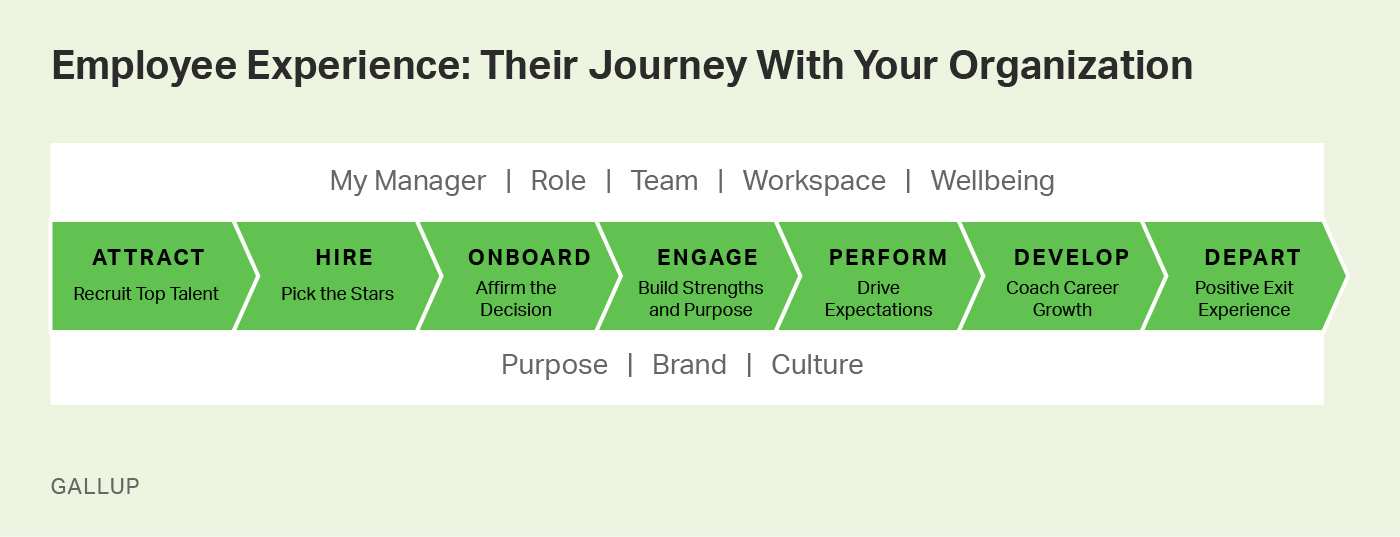Story Highlights
- Managers are the linchpin of a great employee experience
- Learning the top challenges of being a manager can help you improve their engagement
- Creating a better manager experience will benefit your entire organization
How do employees feel about your organization?
The answer to that question influences many of the most important measures of your organization's health -- from retention, engagement and performance to customers, revenue and operational efficiency.
The employee experience is the entire journey an employee takes with your organization. This includes everything from pre-hire to post-exit interactions and all the steps in between. It also includes things like the physical workplace, relationships with coworkers and the ways a job supports one's overall wellbeing.
Gallup's approach to improving the employee experience focuses on seven key stages where employees interact with their organization in a pivotal way.

When an organization gets these seven stages right, the result is a compelling employee experience that creates a distinctive, engaging culture that can drive real, organic growth.
Why Managers Have the Greatest Power to Improve the Employee Experience
If your organization is struggling to construct a cohesive employee experience strategy, it may seem daunting to fix all these aspects at once.
But Gallup has made an incredible discovery: An employee's interaction with their manager is one of the most important factors for success in all seven stages of the employee journey.
Consider just a few facts Gallup has uncovered:
- Attract: Millennials say that "quality of manager" is a top factor they consider when looking for a new job.
- Onboard: When managers play an active role in onboarding, employees are 2.5 times more likely to strongly agree their onboarding was exceptional.
- Engage: Managers account for an astounding 70% of the variance in their team's engagement.
- Perform: Only two in 10 employees strongly agree that their performance is managed in a way that motivates them to do outstanding work.
- Depart: Fifty-two percent of exiting employees say that their manager could have done something to prevent them from leaving their job. Nevertheless, only 51% of employees who left their job had a conversation about their engagement, development or future during the three months leading up to their departure.
Clearly, if you want to radically transform your employee experience, you must first fix your manager experience.
- How can your managers engage employees if they are not engaged themselves?
- How can they provide effective performance reviews if they don't receive them, too?
- How can they create a compelling culture if they are confused about your organization's mission, values and brand?
Or consider it this way: If you can get your manager experience right, it will transform and grow every other dimension of your organization -- from culture to performance management to customers and profit.
Managers are the bridge between leadership's vision and the hard realities of the front line. They are often your most committed employees and they can also be your best critics -- providing valuable feedback that moves the organization forward while avoiding roadblocks and blind alleys. Great managers help their leaders make better decisions while helping employees understand organizational dynamics and making them feel like valuable contributors to an important mission.
Consider it this way: If you can get your manager experience right, it will transform and grow every other dimension of your organization -- from culture to performance management to customers and profit.
Make Your Managers Your Stars, Not Your Scapegoats
Many leaders are likely undervaluing their managers.
Managers have an incredible responsibility. They are responsible for the performance of your organization, as well as its culture, brand and values. But all too often they become the excuse rather than the solution.
The truth is that we know what great management looks like and what it takes to get there, but most leaders haven't implemented best management practices based on the latest science of human behavior.
Here's where leaders can start to change the practice of management at your organization:
- Select managers carefully. Do not choose your managers based on tenure or because someone is a good individual contributor. Select managers who have a natural talent for leading a team and who have demonstrated success working well with others.
- Provide managers with the right support. Most managers tell Gallup their organization has a development program, but these programs are not translating into managers feeling fully prepared for and inspired about their future. Leaders need to do a better job of investing in manager development -- especially in teaching them to have more effective conversations with their team and their boss. You will see the greatest return on investment by tailoring managerial roles and development plans to an individual manager's strengths.
- Understand how it feels to be their shoes. Download our latest report The Manager Experience: Top Challenges & Perks of Managers. It paints an evidence-based portrait of what being a manager is really like, based on our study of more than 50,000 managers.
Learn how to improve the manager experience so your entire company can benefit:
- Give your managers access to on-demand learning, surveys and management insights by subscribing to Gallup Access.
- Download our perspective papers, The Manager Experience: Top Challenges & Perks of Managers and Designing Your Organization's Employee Experience.
- Explore the effect your manager experience can have on your organization.




